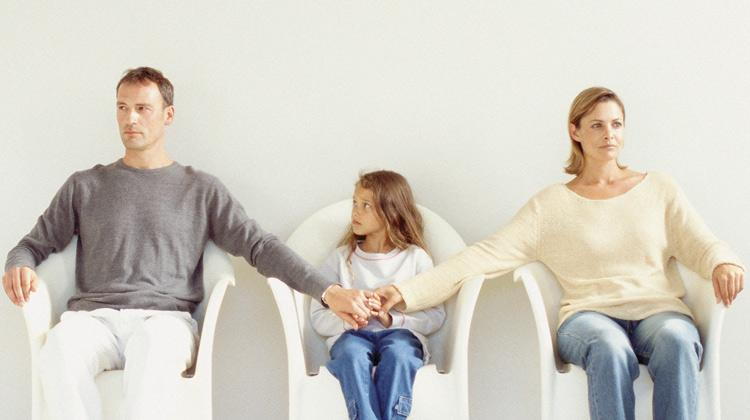
Okay, let's assume you are going through a nasty divorce. (Isn't that a little redundant. )Aren't all divorces nasty? the reader asks. Yes, most divorces are at best unpleasant and at worst horrific. You are probably experiencing some of the following emotions: feelings of sadness, loss, anger, helplessness, hopelessness, abandonment, betrayal, guilt, and remorse.
Like most adults going through a divorce, you are likely to have kids. There may well be a custody battle to see who gets the most time with the children. There is likely to be a certain amount of contempt that you have for your ex, and they are likely to have contempt for you as well. Unfortunately, our legal system often adds fuel to the fire by pitting each partner against each other. Family law attorneys are trained to get the most for their client. So you may be at war with your ex.
So knowing how unfavorable these conditions are, we need to be mindful of how our children are being affected. Children often feel sad, scared, and overwhelmed. Many times, they feel like their entire world has been undone. Depression, anxiety, behavior and school problems are not uncommon.
Unfortunately, parents frequently make matters worse by including their children in their battle. Like pons in a chess game, children are sometimes used to outmaneuver their opponent. When this process is severe (and the other parent is successful in getting the child to dislike and not want contact with the "other" parent), we refer to it as Parental Alienation Syndrome.
Parental Alienation syndrome (abbreviated as PAS) is a term coined by Richard Gardner the early 1980s, that describes a child who has become emotionally distant from a parent due to the undue influence of the other parent. In a nutshell, one parent is manipulating the child to dislike the other parent. Typically, this occurs when parents are going through a divorce and there is a custody battle.
So what would motivate a parent to get their child to dislike their own mother or father? Shouldn't our children have a good relationship with both parents? There are several reasons why a person may lose sight of their child's needs, and try to turn their child against the other parent. Revenge, contempt, financial gain, feeling of betrayal, or abandonment, hurt and anger are the most common.
Here is an example based on a case that I have treated. John, a 42-year-old male is separated and getting a divorce from his 35-year-old wife Jane. They have two children 6 and 14. John filed for divorce when he discovered that his wife was having an affair. He had hired a private investigator who was able to produce photos of his wife and her lover leaving a hotel room. Bitter about his wife's betrayal, he wants revenge at any cost. He shows his children the pictures and tells them that their mother is responsible for ruining their marriage and family. He rationalizes this bad behavior by telling himself that "they should know". Of course, the error is that children should not know everything that is going on in the parent's relationship. Furthermore, parents need to take the high road, understand that children benefit from having a good relationship with both parents, and support the relationship with the other parent. John continues to alienate his children by constantly bad mouthing their mother by telling them that she doesn't care about them, she's selfish,etc., etc. In fact, John takes every opportunity that he can find to put her down and find evidence that she is a bad parent and horrible person. He also uses his children by having them spy on their mother and report back to him who she's dating. He has even had them steal her cell phone so he could retrieve her text messages.
Of course, this is an extreme example, and most parents are not this ruthless in their efforts to get even with their ex. So let's talk about the Dos and Don'ts of Co-parenting:
Do
- Try and separate your feelings towards your ex from your children's. Chances are they are different.
- Remember that children should have every opportunity to enjoy a good relationship with both parents. As a co-parent, it is important to try and support the other parent regardless of your personal feelings towards them.
- Be punctual when picking up or dropping off your child at visitations.
- Be respectful of the other parent regardless of how you feel about them personally.
- Have good boundaries. Make sure that what you share with your children is appropriate and in their best interest. For example: children should not be informed of affairs that may have taken place while the couple was together or custody battles.
- Remember, that if you share custody, you share a common goal: parenting your child. It is important (whenever possible) to maintain a good working relationship with your child's parent.
- Be tolerant of the other parent's parenting skills. They often have a very different style than our own. For example: Don't expect your ex to all of a sudden transform into a highly organized parent when they weren't before the divorce.
- If the other parent is contributing to alienating your child from you, try to approach the "other" parent and politely discuss your concerns. If you are not able to do that, consider getting professional help together with the "other" parent. Getting both parents together with a good therapist can make an enormous difference. When I do mediation or co-therapy counseling, I am often amazed by the positive impact it has on the children, not to mention the parents.
- Consider getting professional help for yourself personally. Even healthy people will benefit from the support and guidance that a good psychotherapist can offer. Furthermore, you will be less likely to use your child as a sounding board and more likely to function better as a parent.
- Consider getting professional help for your children. Don't assume that your kids are OK just because they aren't complaining. Many conscientious parents take their kids to a therapist for a checkup to make sure that they are coping well with the parents' divorce. A good therapist will be able to determine if your child needs treatment.
Dont’s
- Don't argue with the other parent in front of your children. This includes phone conversations as well. Research shows that children are most negatively affected when parents are openly hostile to each other.
- Don't try and make your child an ally in your divorce. Your child needs to remain neutral because they need both of you as parents.
- Don't "bad mouth" the other parent to your child. Furthermore, don't criticize them to others in your child's presence. This also includes telephone conversations that they can overhear.
- Don't use your children as messengers. Frequently when divorced parents don't get along, they use their children to exchange information with the "other" parent. This behavior inevitably puts your child in the middle.
- Don't get in a power struggle with the other parent regarding co-parenting. Even though the divorce may be final, divorced couples frequently argue over everything from what sport their child will play, visitation times, and styles of discipline.
- Don't make a game of building a case against the other parent. Sometimes, especially during a custody battle, one or both parents will constantly be looking for fault in the other parents parenting skills. After a while, this can border on absurd. For example, a child gets a cold while staying at his mother's house and the mother is blamed for being neglectful.
